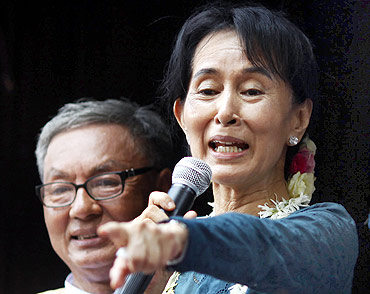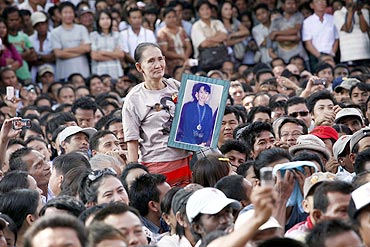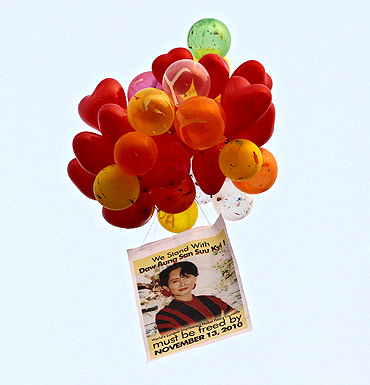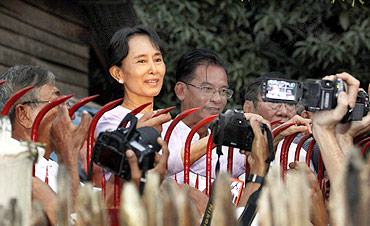
Myanmar's democracy icon Aung San Suu Kyi, freed on Saturday from seven years of house arrest, told thousands of wildly cheering supporters that she would continue to fight for human rights and the rule of law in the military-controlled nation. On Monday, she called for face-to-face talks with the junta's leader.
Addressing a crowd of 50,000 people near the dilapidated headquarters of her political party, she said, "I believe in human rights and I believe in the rule of law. I will always fight for these things. I want to work with all democratic forces and I need the support of the people."
The 65-year-old Nobel Peace Prize laureate told mediapersons her message to junta leader Gen Than Shwe was, "Let's speak to each other directly."
The two last met in secret talks in 2002 at the encouragement of the United Nations.
Agencies

After Suu Kyi's release there was speculation whether she would use her freedom to challenge the ruling military head-on, or be more conciliatory. The charismatic leader said she bore no grudge against those who had held her in detention for more than 15 of the last 21 years, adding that she had been well-treated.
Suu Kyi thanked her well-wishers and asked them to pray for those still imprisoned by the junta. Human rights groups say the government holds more than 2,200 political prisoners.
"If my people are not free, how can I say I am free? Either we are all free together or we are not free together," she said.
Speaking of her isolation while under house arrest, Suu Kyi said that she always felt free within myself.
Suu Kyi has a huge fan following among the Burmese. After speaking to the crowd as she entered the compound of National League for Democracy people shouted, "We love Suu," amid thunderous applause.
The youth in Myanmar hailed Suu Kyi as the only one who might unite the impoverished country. "She's our country's hero," said Tin Tin Yu, a 20-year-old university student. "Our election was a sham. Everyone knows it, but they have guns so what can we do? She's the only one who can make our country a democracy."

Suu Kyi has been released with no conditions on her freedom, a government official from Myanmar said. "She is completely free; there are no conditions at all," added the official.
Suu Kyi's supporters have voiced concern that the junta may place restrictions on her activities and movements as it did during her previous brief periods of freedom.
The state media confirmed her release from the latest seven-year stretch of house arrest, attributing it to good conduct. "Aung San Suu Kyi behaved well according to the regulations during the period she was under a suspended sentence," a government-controlled television channel reported. "So she was allowed to be released from her sentence."
In spite of being under house arrest for the last 15 years, Suu Kyi had refused to give up her fight for democracy in the impoverished nation.
Her party National League for Democracy had secured a landslide victory in the general election in 1990, but the military refused to hand over power and put her under house arrest. Since then Suu Kyi has been under intermittent house arrest, has been imprisoned in the infamous Insein Prison and has even been kept under secret detention for long spells.
In spite of the junta's brutal ways of suppressing democracy in the country, Suu Kyi, a staunch follower of Mahatma Gandhi, had refused to let go of her non-violent protest.
In recognition of her valiant fight for freedom, she was awarded the Nobel Peace Prize in 1991 and the Mahatma Gandhi Peace Award in 2009.